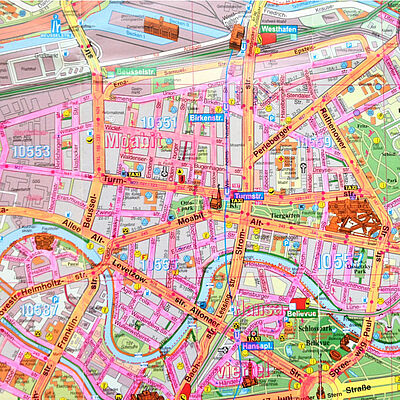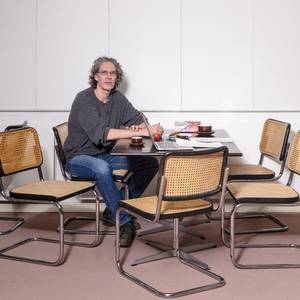Walking Berlin

by Michael Jennions
I wish I could remember my first, hesitant steps. I should. I was, after all, 47 years old at the time. But it is true that I cannot remember my first walks in Berlin. It all began when I started recording where I had walked by coloring in the roads on a tourist map. I had a cheap fluorescent marker, and the white lines delineating the roads were transformed into pretty pinkness. Grunewald soon became a lattice of princess-colored slashes. I liked the effect. It was pleasing. In fact, I was tickled pink. But already a grotesque plan was forming in my brain: Grunewald is a pleasant stroll – its architecture illustrates the timeless tastelessness of the ostentatiously rich – but Grunewald is also a remote outpost in the wider Berlin archipelago with its diversity of commercial, cultural and culinary islands, each populated by a different tribe. I needed to venture into Berlin proper and explore. I started in Charlottenburg. The people-watching amused me: rich ladies with artificially bronzed skin stretched taut as a yacht’s mainsail; the occasional pension-aged punk wearing fashion from the 70s with no sense of post-modern irony. Then there were the one-offs. The man at the Halensee S-Bahnstation who leaned forward as though dislodging a bolus of food from his throat and proceeded to buck his torso up and down while barking like a dog. Berliners streamed past in a trance, barely glancing at his canine antics. It was all rather wonderful. I liked being on the streets of Berlin. Things happened. I later discovered that Berliners might remain impassive when faced with a howling madman, but setting foot on their bikepath was a step too far.
My map started to seduce me. The streets around Kufürstendamm were turning pink at a satisfactory rate. But I now craved more pinkness. How many streets could I transform? A few streets in each section of the city would have been a sensible goal. Perhaps leisurely weekend outings to all the tourist-approved landmarks? But my brain would not permit such a rational plan of action. No! My brain decided that I would walk every single street within the Ringbahn. My brain did not consult me about this. It simply tricked me into starting. One day I was casually wandering along, drifting like an autumn leaf. The next day I found myself determinedly walking to the end of a dead-end street then doubling back. I repeated this action on the next block. “This is stupid,” I said. “Shut up,” said my brain, “you know you like the perfect pink quadrats on your map. You must do this. Every side street. Every cross street. In fact every single street on your map that has a name to it is one that you must walk. Do it!” So I did.
If you like factoids, I’ve got some for you.* There are 1011 kilometers of municipal roads within the Ringbahn. The district of Mitte has 311 kilometers, nearby Charlottenburg and Wilmersdorf have 211 kilometers, and Treptow-Köpenick has a paltry 17 kilometers. On the whole, 1011 kilometers is not that far to walk: equivalent to 24 marathons. Do half a marathon every weekend for a year – you can even take a month off to rest– and you will be done. Though not quite. Berlin is not set out on a grid system so the art of obsessive-compulsory streetwalking results in repeated transits down the same thoroughfares. And there is an additional logistic constraint. Eventually you have to head home to work. You must find the nearest S- or U-Bahn, even if this means retracing many of your earlier steps. The main arteries of Berlin become intimately familiar to you. You are a street junkie injecting yourself into them to make a new score and get that rush.
You might by now be thinking: “My god this man is a genius. This crazed stunt is a subversive act of performance art.” And if you are thinking this, you are deeply mistaken. You should be thinking: “There’s something seriously wrong with this guy.” My brain and I have discussed this at length. Here is what we have decided.
There is no sensible reason to walk every street in Berlin, but it does have its perks. You can try to elevate the experience into something loftier. You can record quirky sights: Why, for example, would someone abandon a vacuum cleaner in the middle of a cemetery? You can indulge in social commentary: What does it mean when, having willfully avoided reading the travel guide which informs you that certain buildings will positively stun you with their architectural ingenuity, you will sometimes walk past them without a backward glance? But at other times you will then grind to a halt and backtrack to stare. (I’m talking about you, Nordic embassy building.) Later you will realize the empowerment of knowing that you found it. That you decided for yourself what does and does not impress you.
You can muse philosophically: Why do streets always seem longer the first time you walk them? Is this driven by the same mental process that causes life to speed up as we age because we absorb fewer new experiences to demarcate the passage of time? Or you can highlight the tenacity of nature: Did you really stand on a street near Fehrbelliner Platz barely six feet from a Goshawk ferreting around in a scruffy wintry hedge while it evicted a sparrow and then pursued it down the valley-like street, both birds swerving and ducking, while movers hoisted a sofa into a van, oblivious to the strangely silent life-and-death battle being waged above their heads? You can pontificate on why some areas make it into travel guides and others do not: Why do online blogs which list cafés making “incredible coffee that was generated by being passed through the colon of Cuban mongooses” always seem to recommend those establishments situated in Kreuzberg or Prenzlauer Berg? You can find plenty of interesting coffee shops in Moabit or – this might even surprise Berliners – suburban Tempelhof. You can note strange coincidences: The pink seeping into your tattered map as you stake your claim to Berlin resembles that very color which identified the British colonies in the old commonwealth atlas your father passed down to you as a child. Are you really trying to conquer Berlin? If so, you will surely lose.
Indeed, you could do all these things to justify your rambling: to turn the pedestrian into the poetic. You could even bind everything together in a heady intellectual stew by invoking the image of the flâneur, the psychogeography of the Situationists and the urban fiction of J.G. Ballard. The culmination of this enterprise would surely be a book, a bestseller perhaps, entitled Lord of the Ringbahn. This would, however, be predicated on having kept a meticulous diary and your accumulating a wealth of thoughts. But what if you had instead kept no notes and decried any attempt to pretentiously turn your hobby into art? What if you had often wandered in a mindless daze listening to podcasts about the ludicrous impossibility of a President Trump, or creating your own Berlin soundtrack by incessantly playing Romano’s hiphop song Köpenick while occasionally wondering if you should perhaps not go home and do some work? Well, if that were the case then all you would emerge with is this pedestrian essay.
Footnote: As of February 21, I have walked the entirety of the requisite parts of Charlottenburg, Wilmersdorf, Tempelhof, Schöneberg and Alt Treptow, three quarters of Neukölln and half of Mitte. Shorter forays have been made elsewhere – there was even a memorable 33-kilometer nocturnal scouting mission through Prenzlauer Berg, Friedrichshain and Kreuzberg during the first freezing of the pavements – but, as with any story set in Berlin, the real battle lies ahead in the East.
* Many thanks to Stefan Gellner from the Wiko library services for doing the impossible.
